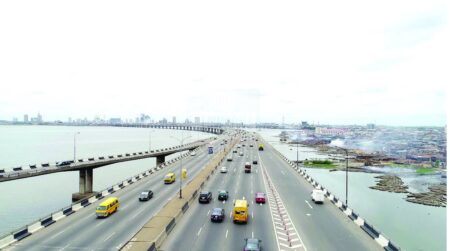Anyone who has plied Kaduna-Abuja road may conclude that that road is the busiest road, but don’t be surprised that the Third Mainland Bridge is the busiest road in Nigeria.

Located in the commercial city of Lagos, Southwest geopolitical zone, Third Mainland, according to the Minister of Works and Housing, Babatunde Fashola, is the busiest road in Nigeria.
What makes Third Mainland Bridge the busiest?
According to the latest statistics released by the minister, Third Mainland Bridge has an average daily vehicular traffic of 117,000.
Using the average traffic per day, it means that the Third Mainland Bridge has at least 585, 000 vehicular movement Monday to Friday, days considered as working days.
Don’t forget that vehicular movements on the road is higher on Fridays and Saturdays as a result of road users travelling for social activities.
Mr Fashola stated this recently while addressing the Lower Legislative Chamber committee on works chaired by Ahmed Birchi.
Fashola was the governor of the commercial capital of Nigeria between May 29, 2007 to May 29, 2011. According to him, the data provided an estimate of the money that could be made if toll fees are collected.
How much can FG make per day on Third Mainland Bridge per day?
If Third mainland Bridge is tolled at the rate of N500 per vehicle, based on the average of vehicles that ply the road, it means N58, 500, 000 will be generated per day.
He said, “For the first time in 10 years, the Ministry of Works undertook a traffic count nationwide on strategic roads; we completed it in 2017.”
Presenting the report he told the federal lawmakers that, “What you see (in the document) before you are reporting; so where you see the average daily traffic (ADT), the top item on the far right is Enugu-Abakaliki and it shows ADT is 20,746 vehicles.”
The former governor said further, “The projected traffic in 20 years is what is under it and if you look through all those columns from the left, Lagos-Ibadan, Ogere northside the ADT there is reported as 25.1 thousand and projected to rise to 45,000 vehicles.
“This (document) provides more information for those who make the argument that if you toll the roads you get all the money.”
Fashola said that states across the country will no longer get refunds for fixing federal roads, “When we came in, we inherited quite a number of such debts from states which repaired Federal roads and asked for refunds. The President directed that we pay all those that were approved by the previous government.”
He called on state governors to concentrate on their own roads and that “states can only get involved in Federal roads if they are repairing them and not coming to ask for a refund.”
Featured image:
- The Guardian


